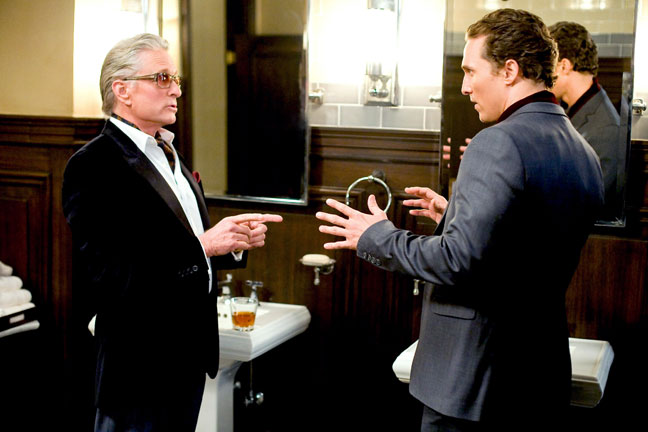What can be done with Matthew McConaughey at this point? Back at the beginning of his acting career, in Dazed and Confused, he played a character who bragged about getting older while his girlfriends stayed the same age.
If David Wooderson were real and attending movies in the present day, he’d surely be in stoned awe of his portrayer’s ability to stop the clock. The actor, who turns 40 this year, seems not to have aged a jot since 1995, when he landed his first Hollywood leading role in A Time to Kill. Since then, he’s headlined some other thrillers that have been profitable, but he’s made most of his stardom off his romantic comedies, where his laid-back charm is shown off to best advantage.
 I can’t fault McConaughey for recognizing his strengths and playing to them. Nevertheless I’m puzzled that for all his work in the genre, he still hasn’t starred in anything approaching a great romantic comedy. By now his performances have devolved into shtick, and his smoothness has turned slippery; he threatens to squirt right out of his movies. It certainly doesn’t help that he’s almost always cast opposite soft, non-confrontational types like Kate Hudson and Sarah Jessica Parker, who are too much like him. Perhaps a harder-edged leading lady who was more willing to challenge him might badger him into doing something interesting. Who would that be? Anne Hathaway? Cate Blanchett in her Queen Elizabeth mode? I’d suggest Angelina Jolie, but we’re looking for someone to challenge him, not eat him up in one gulp.
I can’t fault McConaughey for recognizing his strengths and playing to them. Nevertheless I’m puzzled that for all his work in the genre, he still hasn’t starred in anything approaching a great romantic comedy. By now his performances have devolved into shtick, and his smoothness has turned slippery; he threatens to squirt right out of his movies. It certainly doesn’t help that he’s almost always cast opposite soft, non-confrontational types like Kate Hudson and Sarah Jessica Parker, who are too much like him. Perhaps a harder-edged leading lady who was more willing to challenge him might badger him into doing something interesting. Who would that be? Anne Hathaway? Cate Blanchett in her Queen Elizabeth mode? I’d suggest Angelina Jolie, but we’re looking for someone to challenge him, not eat him up in one gulp.
His latest comedy, Ghosts of Girlfriends Past, pairs him with Jennifer Garner, and smart and resourceful though she is, she’s not the actress he needs. McConaughey plays Connor Mead, a well-regarded fashion photographer who’s notorious for bedding every halfway attractive woman he meets, and Garner plays Jenny Perotti, a childhood sweetheart who once fell for him only to see him walk away because things got too real. They’re reunited at the Mead family estate when they attend the wedding of Connor’s brother, Paul (Breckin Meyer), to Jenny’s friend Sandra (Lacey Chabert). On his way to close the deal with the one bridesmaid that he hasn’t had sex with yet, Connor is visited by the ghost of his deceased Uncle Wayne (Michael Douglas), an even bigger skirt-chaser in life, who announces that Connor’s going to see three more apparitions that night who’ll show him the error of his ways, Charles Dickens-style.
A movie like this has to set up its main character as defective at the beginning, and, wow, this one does the job. Connor spends the first 20 minutes here behaving like a real bastard, breaking up with three girlfriends simultaneously via conference call, openly declaring that Paul is making a mistake by getting married, and not backing off or even showing any embarrassment when he finds out that the older woman he’s been hitting on (Anne Archer) is Sandra’s mother. (Archer strikes more erotic sparks off McConaughey than Garner does. Maybe he should look into an older leading lady for his next project.) As much credit as the filmmakers are due for not pulling their punches, McConaughey’s portrayal of this horndog is too similar to what he does in other movies. He has neither the range nor the inclination to be as rotten as the role demands.
One nice thing the comedy does is spread out the laughs. Director Mark Waters (Mean Girls) gives us sight gags to savor in the corner of the frame while the plot is busy unfolding. The throwaway jokes here frequently hit home – when Wayne’s ghost passes through Connor’s body, Connor licks his lips and marvels, “Aqua Velva!” – and they give play to supporting actors like Robert Forster as the bride’s Marine dad, Noureen DeWulf as Connor’s put-upon assistant, and Emma Stone as the girl who deflowers Connor in the 1980s. Douglas usefully reminds us that he can be funny when he’s in the right role, and is this ever the right role.
The jokes can’t give urgency to the romance, though, nor can they redeem the fundamental line of crap that this movie is selling. Ghosts of Girlfriends Past would have us believe that inside even the most cynical player there’s a bruised romantic who needs to be told that it’s OK to feel. The movie never entertains the possibility that some men simply like having loads of sex without emotional entanglements. In telling the story of a reprobate’s spiritual awakening, this movie engages in the same type of wish-fulfillment as A Christmas Carol. The big difference is that Charles Dickens didn’t pander to his female readers by telling them that Ebenezer Scrooge could suddenly transform into the man of their dreams. Making that fantasy credible requires more finesse than these filmmakers have. It probably would have taxed Dickens himself. l









